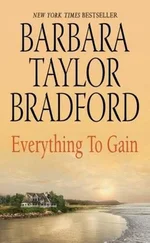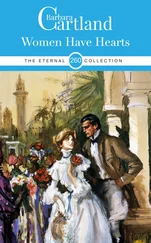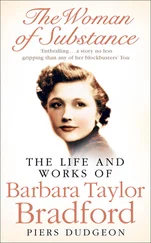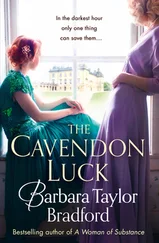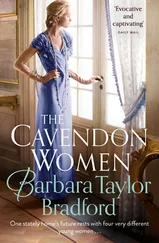The only disturbing factor in Emma’s life was Edwina’s continued estrangement, for she had not been able to mend the rift between them. Her only tenuous communication with her eldest daughter was through Winston, who took care of Edwina’s financial affairs on Emma’s behalf. After two years at the finishing school in Switzerland, Edwina had taken a flat in Mayfair and was leading a dizzy social life with her upper-class friends, enjoying her status as the well-heeled daughter of a very rich woman. Emma had not curtailed Edwina’s spending, and had set up a trust fund for her which gave the girl an annual income of no mean proportions. Emma longed to see Edwina, to draw her back into the bosom of the family, yet she was wise enough to refrain from making overtures, understanding that the first move must necessarily come from the girl.
And so for the most part Emma was content, more so than ever before. Paul’s abiding love, and hers for him, sustained her at all times. Emma also took great consolation in Daisy, who was her particular pride, and even though she was reluctant to admit it even to herself, she loved Daisy more than any of her other children. This was the child of love, the one child she truly carried with joy. There was a closeness between them she had not experienced with those born before, and it only became stronger with time. Sometimes, when she looked at the growing child, Emma’s heart would clench with the most overwhelming feelings of tenderness, seeing her beloved Paul so perfectly reflected in her. For Daisy was undoubtedly her father’s daughter, favouring him in every way. Being his constant companion, she unconsciously copied many of his mannerisms and when she smiled her face became as mischievous and as endearing to Emma as his. By nature Daisy was sweet and loving, and because of the affection and attentions showered on her by her parents she was a self-confident, outgoing little girl, yet she was utterly unspoiled and natural with everyone. There was much of Emma in her character. She had inherited her mother’s sunny disposition, her optimism, and her stubborn will.
When Daisy was five years old, Paul had insisted she accompany him and Emma to Australia. After a week in Sydney he took them up to Coonamble and they spent four weeks at Dunoon. An unusual rapport sprang up between the vivacious little girl and her half brother, Howard, and Emma and Paul were touched by the relationship. Daisy seemed to reach the boy in a way no one else ever had before, and her devotion to him and his dependency on her warmed their hearts. They returned every year thereafter with Paul, who did not want to deprive Howard of the joy his little stepsister so apparently brought to his restricted life.
The years slipped by so quickly Emma often wondered what happened to time. The children were all growing up and leaving the house in Belgrave Square. Kit, a fine-looking young man who much resembled Joe Lowther, went to Leeds University, and the twins departed for their respective boarding schools, bitterly complaining about being separated for the first time. If Daisy was Emma’s best-loved child, then Robin was undoubtedly her favourite son, and she missed him more than she had realized she would during school terms. Robin had none of Arthur Ainsley’s annoying characteristics or habits, and bore a strong likeness to Winston. He was a thin vital boy, with a vivid intelligence, a quick wit, and inbred charm. Scholarly by inclination, he was a brilliant student and Emma had high expectations for him.
His twin, Elizabeth, also favoured the Harte side of the family. Emma would sometimes look at her and catch her breath, seeing striking echoes of her own mother in the girl, and occasionally she even caught a fleeting glimpse of Olivia Wainright in Elizabeth’s lovely face. She would ponder briefly then on the past, recalling the uncanny resemblance between those two women from such different worlds and which had so startled her as a girl. Of all Emma’s children, Elizabeth was the real beauty, willowy, graceful, her exquisite face delicately translucent, surrounded by a thick cloud of dark hair. She too, was blessed with an abundance of charm. Unfortunately, Emma had long detected other traits in her, which she found dismaying. Elizabeth was violent of temper, flighty, and often difficult to control. Paul agreed with Emma that she needed a firm hand, and they hoped that the discipline of boarding school would tone her down without breaking her spirit.
Emma’s businesses continued to grow. The Knightsbridge store became world-famous, the Yorkshire stores a household name in the North; the mills flourished, as did the Kallinski clothing factories; the Emeremm Company, now known as Harte Enterprises, blossomed into an enormously rich organization with diverse holdings throughout the world. By following her own shrewd instincts and listening to Paul’s advice, Emma invested her money wisely and multiplied her worth threefold, as well as that of Winston and Frank, whose personal financial affairs she supervised. By the time she was forty-six years old she was a millionairess many times over and a power to be reckoned with, not only in London and the north of England, but in international business circles as well.
Despite her happiness with Paul and her family, and as preoccupied as she was with her gargantuan business enterprises, Emma’s interest in the Fairley family had not waned one iota. Their affairs continued to obsess her as they always had. Gerald Fairley, after she had ruined him in 1923, spent the last few miserable years of his life depending on the largesse of Edwin, since the brickyard was not a profitable concern. He died in 1926, ‘obviously from the gross excesses of his nature’, Emma had remarked to Blackie on hearing the news, and in the ensuing years her icy gaze had rested solely on Edwin. She followed his career with undivided interest. How she had longed for him to be a failure! But he had made a name for himself as a criminal lawyer of great brilliance, and there were constant rumours in the Temple that he would be made a K.C., although this had not yet happened. He resided and practised in London, but he had not entirely severed his ties to Yorkshire. He was often in Leeds, where he devoted an unflagging amount of energy to the Yorkshire Morning Gazette, just as Adam Fairley had done before him. He was chairman of the board and the majority shareholder, and thus wielded the power on the newspaper.
Emma wanted that paper and she would stop at nothing to get it. Both Winston and Blackie pointed out that she had done enough to cripple the Fairley influence in Yorkshire, and remonstrated with her to drop her vendetta and forget about the newspaper. But Emma, as self-willed as always and still vindictive about the Fairleys, would not listen. She was determined to acquire their only remaining holding. Gradually she began to buy up the common shares as they came on to the market, moving with her usual stealth, and waiting patiently until she could find the right opportunity to move against Edwin. Although the paper was losing money, Edwin somehow managed to keep it operating and he clung to his shares, much to Emma’s frustration. Until she could wrest those shares from him she was powerless to move in and take over. She dreamed about the day she would oust Edwin. Only then would her revenge be complete.
‘And I do have the patience of Job,’ she told Winston one day in the summer of 1935. ‘I won’t rest until I own the Yorkshire Morning Gazette , and I will own it one day.’
‘I know you will,’ Winston said, and shifted in his chair. He lit a cigarette and went on, ‘I had a call from Joe Fulton yesterday. He’s prepared to sell you the remainder of his shares in the Sheffield Star. If you buy, you will have control. Do you want them?’
Читать дальше
Конец ознакомительного отрывка
Купить книгу

